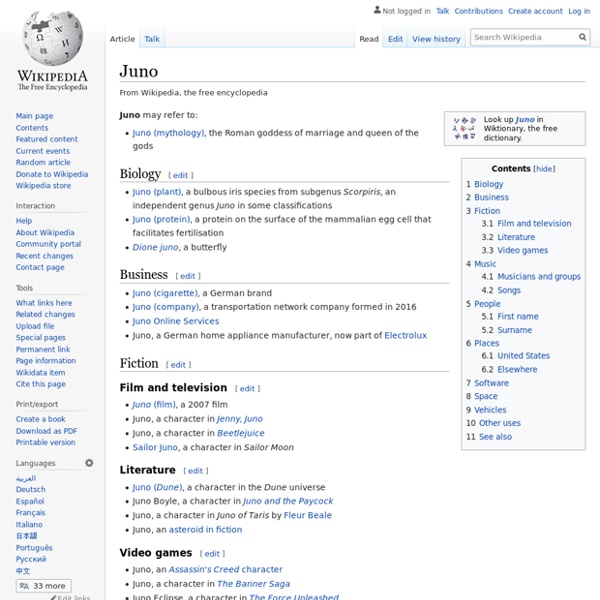Jupiter
Fifth planet from the Sun in the Solar System Formation and migration Astronomers have discovered nearly 500 planetary systems with multiple planets. Regularly these systems include a few planets with masses several times greater than Earth's (super-Earths), orbiting closer to their star than Mercury is to the Sun, and sometimes also Jupiter-mass gas giants close to their star. Earth and its neighbor planets may have formed from fragments of planets after collisions with Jupiter destroyed those super-Earths near the Sun. As Jupiter came toward the inner Solar System, in what theorists call the grand tack hypothesis, gravitational tugs and pulls occurred causing a series of collisions between the super-Earths as their orbits began to overlap.[24] Researchers from Lund University found that Jupiter's migration went on for around 700,000 years, in a period approximately 2–3 million years after the celestial body started its life as an ice asteroid far from the sun.
Juno
From Wikipedia, the free encyclopedia Jump to navigationJump to search Juno could mean: Music[change | change source]
Venus
Second planet from the Sun in the Solar System Venus is a terrestrial planet and is sometimes called Earth's "sister planet" because of their similar size, mass, proximity to the Sun, and bulk composition. It is radically different from Earth in other respects. It has the densest atmosphere of the four terrestrial planets, consisting of more than 96% carbon dioxide. The atmospheric pressure at the planet's surface is about 92 times the sea level pressure of Earth, or roughly the pressure at 900 m (3,000 ft) underwater on Earth. Venus has, by far, the hottest surface of any planet in the Solar System, with a mean temperature of 737 K (464 °C; 867 °F), even though Mercury is closer to the Sun.
Keroessa
Story[edit] According to the historian Hesychius of Miletus,[3] as Io, changed into a heifer and being chased by a gadfly on behalf of the jealous Hera, was passing through Thrace, she gave birth to a girl, Keroessa, on the banks of the Golden Horn, by the altar of the nymph Semestra. Keroessa was reared by Semestra and grew up surpassing other local maidens in beauty. She had intercourse with Poseidon and in due course gave birth to a son, whom she named Byzas.
Achilles
In Greek mythology, Achilles (/əˈkɪliːz/; Ancient Greek: Ἀχιλλεύς, Akhilleus, pronounced [akʰillěws]) was a Greek hero of the Trojan War and the central character and greatest warrior of Homer's Iliad. Achilles was said to be a demigod; his mother was the nymph Thetis, and his father, Peleus, was the king of the Myrmidons. Etymology[edit] Achilles' name can be analyzed as a combination of ἄχος (akhos) "grief" and λαός (Laos) "a people, tribe, nation, etc." In other words, Achilles is an embodiment of the grief of the people, grief being a theme raised numerous times in the Iliad (frequently by Achilles).
Britannica
Mercury, Latin Mercurius, in Roman religion, god of shopkeepers and merchants, travelers and transporters of goods, and thieves and tricksters. He is commonly identified with the Greek Hermes, the fleet-footed messenger of the gods. The cult of Mercury is ancient, and tradition has it that his temple on the Aventine Hill in Rome was dedicated in 495 bce. There Mercury was associated with Maia, who became identified as his mother through her association with the Greek Maia, one of the Pleiades, who was the mother of Hermes by Zeus; likewise, because of that Greek connection, Mercury was considered the son of Jupiter. Both Mercury and Maia were honoured in the Mercuralia festival on May 15, the dedication day of Mercury’s temple on the Aventine. Mercury is sometimes represented as holding a purse, symbolic of his business functions.
Vesta
From Wikipedia, the free encyclopedia Jump to navigationJump to search Vesta may refer to: Fiction and mythology[edit] Brands and products[edit] Lada Vesta, a car from Russian car manufacturer AVTOVAZSwan Vesta (began 1883), a brand of matches Vesta case, metal containers for matches (which were previously called vestas)
Mercury
Mercury usually refers to: Mercury may also refer to: Arts and entertainment[edit]



